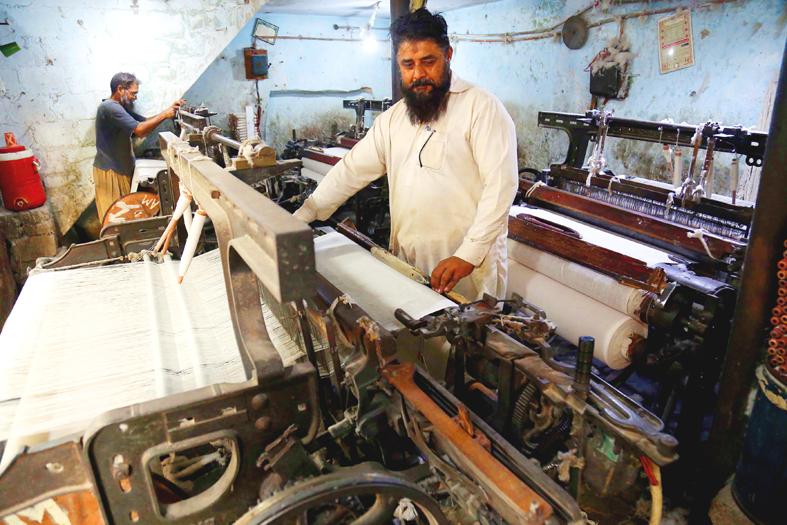Pakistan’s textile sector is bringing cheer to its flailing economy, with exports set to swell to a record after gaining an edge over South Asian rivals during the COVID-19 pandemic.
Textile exports are poised to surge 40 percent from a year earlier to a record US$21 billion in the 12 months ending in June, said Abdul Razak Dawood, commerce adviser to Pakistan’s prime minister.
Dawood said that the figure would expand to US$26 billion in the next fiscal year, surpassing the nation’s total exports last year, he said.

Photo: EPA-EFE
The textiles industry — which supplies everything from denim jeans to towels for buyers in the US and Europe — is one of the country’s few economic bright spots. Textiles amount to about 60 percent of Pakistan’s exports, and the nation allowed its factories to open ahead of India and Bangladesh when the pandemic emerged in 2020, drawing orders from global brands including Target Corp and Hanesbrands Inc.
“A lot of orders actually were shifted from Bangladesh and India to Pakistan” during the pandemic, Dawood said. “The other good thing that’s happening is we are now becoming competitive with Bangladesh. Three, four years ago, Bangladesh was really beating us.”
The government also plans to announce a proposal next month to provide incentives for exports to new markets such as Africa, South America and Central Asia, Dawood said.
The nation is doubling down to boost textile exports through measures including tax breaks, cheap loans and supplying electricity at rates comparable to rivals in South Asia. A 60 percent decline in the local currency against the US dollar since 2018 has also helped.
“Pakistan’s exports have become competitive over the past few years,” Ismail Iqbal Securities CEO Ahfaz Mustafa said. “There is a fixed energy tariff regime that keeps in mind regional prices. The government is much quicker to refund the money it owes exporters and there has been a giant currency devaluation.”
The South Asian nation is looking to increase its exports to get out of regular boom-bust economic cycles that have led it to seek help from the IMF 13 times since the late 1980s. It is also trying to revive a US$6 billion bailout program to meet financing requirements amid a record trade deficit.
Pakistan’s commerce adviser said there is “very little” that can be done about the nation’s record-high imports, which are driven mainly by purchases of petroleum products and vaccines.
Pakistan would be “under pressure” if oil hits US$100 a barrel, Dawood said.
He expects food-related imports to decline this year following a better domestic crop harvest.
The nation is also pushing to intensify trade with Central Asian nations by signing agreements and allowing free movement of trucks. Trade has grown to US$120 million in six months of the current fiscal year from US$14 million of the entire previous year, he said.

SEMICONDUCTORS: The firm has already completed one fab, which is to begin mass producing 2-nanomater chips next year, while two others are under construction Taiwan Semiconductor Manufacturing Co (TSMC, 台積電), the world’s largest contract chipmaker, plans to begin construction of its fourth and fifth wafer fabs in Kaohsiung next year, targeting the development of high-end processes. The two facilities — P4 and P5 — are part of TSMC’s production expansion program, which aims to build five fabs in Kaohsiung. TSMC facility division vice president Arthur Chuang (莊子壽) on Thursday said that the five facilities are expected to create 8,000 jobs. To respond to the fast-changing global semiconductor industry and escalating international competition, TSMC said it has to keep growing by expanding its production footprints. The P4 and P5

DOWNFALL: The Singapore-based oil magnate Lim Oon Kuin was accused of hiding US$800 million in losses and leaving 20 banks with substantial liabilities Former tycoon Lim Oon Kuin (林恩強) has been declared bankrupt in Singapore, following the collapse of his oil trading empire. The name of the founder of Hin Leong Trading Pte Ltd (興隆貿易) and his children Lim Huey Ching (林慧清) and Lim Chee Meng (林志朋) were listed as having been issued a bankruptcy order on Dec. 19, the government gazette showed. The younger Lims were directors at the company. Leow Quek Shiong and Seah Roh Lin of BDO Advisory Pte Ltd are the trustees, according to the gazette. At its peak, Hin Leong traded a range of oil products, made lubricants and operated loading

The growing popularity of Chinese sport utility vehicles and pickup trucks has shaken up Mexico’s luxury car market, hitting sales of traditionally dominant brands such as Mercedes-Benz and BMW. Mexicans are increasingly switching from traditionally dominant sedans to Chinese vehicles due to a combination of comfort, technology and price, industry experts say. It is no small feat in a country home to factories of foreign brands such as Audi and BMW, and where until a few years ago imported Chinese cars were stigmatized, as in other parts of the world. The high-end segment of the market registered a sales drop

Citigroup Inc and Bank of America Corp said they are leaving a global climate-banking group, becoming the latest Wall Street lenders to exit the coalition in the past month. In a statement, Citigroup said while it remains committed to achieving net zero emissions, it is exiting the Net-Zero Banking Alliance (NZBA). Bank of America said separately on Tuesday that it is also leaving NZBA, adding that it would continue to work with clients on reducing greenhouse gas emissions. The banks’ departure from NZBA follows Goldman Sachs Group Inc and Wells Fargo & Co. The largest US financial institutions are under increasing pressure